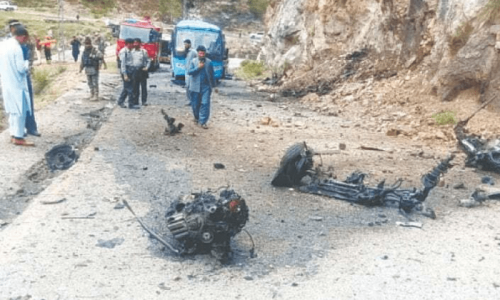THE attack on Chinese engineers in Bisham recently was a grim reminder of the complexities the state faces in ensuring the safety of foreigners. The probe committee’s findings revealed serious lapses in security measures. The bus, far from being bombproof, was not even bulletproof. Such failures demonstrate a systemic disregard for the safety of foreigners working on strategic projects within Pakistan. But why, despite the Chinese coming under attack repeatedly, is this pattern of negligence allowed to persist? There may be no simple answer, but there is also no denying that our security apparatus is plagued with a lack of coordination, accountability, and adherence to established procedures.
There were three attacks inside of a week in March with the aim of undermining Chinese projects in Pakistan. The Chinese have invested billions in projects across the country and Pak-China ties are nearly as old as our nation itself. Experts point towards religious extremism, perceived threats against traditional values due to development projects under CPEC, non-state actors and separatist saboteurs.
But blaming external elements without introspecting on internal security flaws and lack of effective counterterrorism strategies is counterproductive. Moreover, it will not do to point fingers at the victims and say they are the ones “resentful” of security protocols. One must remember that the state’s history of compromises with militant groups like the TTP has only emboldened those with nefarious intent.
At the same time, we cannot close our eyes to the fact that a sharp rise in terror attacks does coincide with the Taliban takeover in Kabul. While no one came forward for the Bisham attack, separatists were quick to claim those in Balochistan. The security establishment is likely eyeing a foreign hand. But conjecture alone will not rid us of our troubles. The problem still remains, regardless of the source.
A re-evaluation of how security is conceptualised and implemented here is long overdue. Ensuring the safety of foreign citizens is paramount, not just for diplomatic relations but for our economic future. Our friendly ties can only weather so much. How long before the Chinese decide to reconsider their investments here? Their citizens have come under attack too many times since the multibillion-dollar CPEC project was announced in 2015 — one that has been seen as a game changer for infrastructure, transport and electricity.
The state must employ seriousness in tackling this challenge. This includes enhancing intelligence-sharing and CT cooperation, ensuring strict adherence to security SOPs, and fostering a culture of accountability, with shortcomings promptly addressed.
Furthermore, engaging with residents to alleviate concerns regarding development projects, working with them on localised development projects, and tackling the root causes of extremism is essential. Only then can Pakistan hope to safeguard its guests and, by extension, its national interests and international partnerships.
Published in Dawn, April 13th, 2024















































Dear visitor, the comments section is undergoing an overhaul and will return soon.